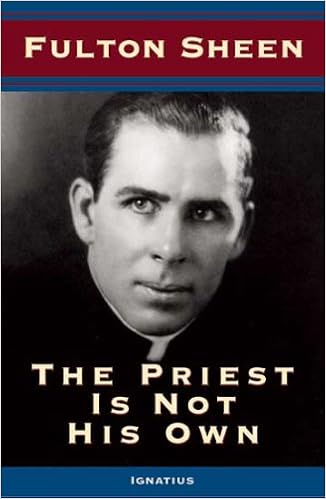I’ve always had an appreciation for the priesthood. As a small child, I actually dreamed of becoming a bishop before hearing that I would not be allowed to marry. However, while I have understood the basics of the priesthood, I wanted to get a greater understanding of its role, nature, etc. So during a conversation with one of my priests from IU about the priesthood, he recommended the book “The Priest is Not His Own,” by future saint Archbishop Fulton J. Sheen, America’s second most famous televangelist (behind only Rev. Billy Graham). The book was actually such an impressive overview of the priesthood that I felt a need to share it here.
Now, it should be noted that this isn’t a traditional review like my previous ones. In this case, I want to discuss the deeper implications and statements of Sheen as opposed to just saying what the book’s good or bad at. So most of this will actually be aimed at discussing his points. Likewise, I finished this book a couple weeks ago so it has been a while since I’ve read it and I might not be as detailed as I should be. However, I still wanted to share it here because this is a good book that deserves attention.
The key to the priesthood is what calls him into the vocation. The priest is defined as receiving a calling from God to perform his deeds, not acting out his own agency. His work is God going through him, making the priest little more than a tool of God’s grace so that the Lord’s works may be done for the benefit of mankind. There is much that must be done in promoting God’s work on this earth so he is the one that must perform that.
In so doing, the priest is a reconnection between God and man. Fulton Sheen described him as a literal Jacob’s ladder, allowing man a path towards heaven. Man was after all separated from God in the Garden of Eden. So the priest must perform the sacraments and duties of Christ, such as the Eucharist, which bring about that reconnection. This makes him God’s agent.
The key to performing this then is the rejection of the self. The priest must reject the vices of the flesh and overcome his own brokenness. He must continue to pursue a relationship with God above the moral vices of sin. This is of course what every person is called to as our duty as Christians is to become like Christ. However, the Priest must take this extremely seriously since that is his literal vocation.
In so doing, sacrifice is a huge part of the priesthood. The priest must forgo many things of this world in order to emulate his maker. Suffering and pushing himself for his flock is a huge focus in the book. He is essentially performing his own crucifixion as he sacrifices himself for God’s offspring. In this way, becoming Christlike is his goal.
Yet his humanity is also a huge part of his job. It allows him to relate to his fellow man and go to them where they are. In this way, he can better connected to people and bring them to Christ. Though not discussed in the book, this also allows different approaches to the priesthood and allows for more variety in addressing people’s needs. So this connection allows the priest to act as God’s tool yet still bring a needed individual approach.
The final thing to review in the book is how it is written. Fulton Sheen is an effective writer and gets his point across clearly. He provides a lot of information in the book and it becomes easy to all take in. He is a very good writer and knows a lot about the subject (duh!). As a result, it makes the book a very effective presentation of the priesthood and its purpose.
This is more of a Clift notes of the book as Sheen does go into a lot of detail. For that reason, I highly recommend reading it to get the full understanding of the priesthood. However, the overall points explain what the priesthood is and its role in the church, which should be brought to attention. It simplifies the mystical and makes us better understand its significance. It further solidifies why Sheen will most likely become a saint and the overall fundamental purpose of Catholicism: following Christ.





